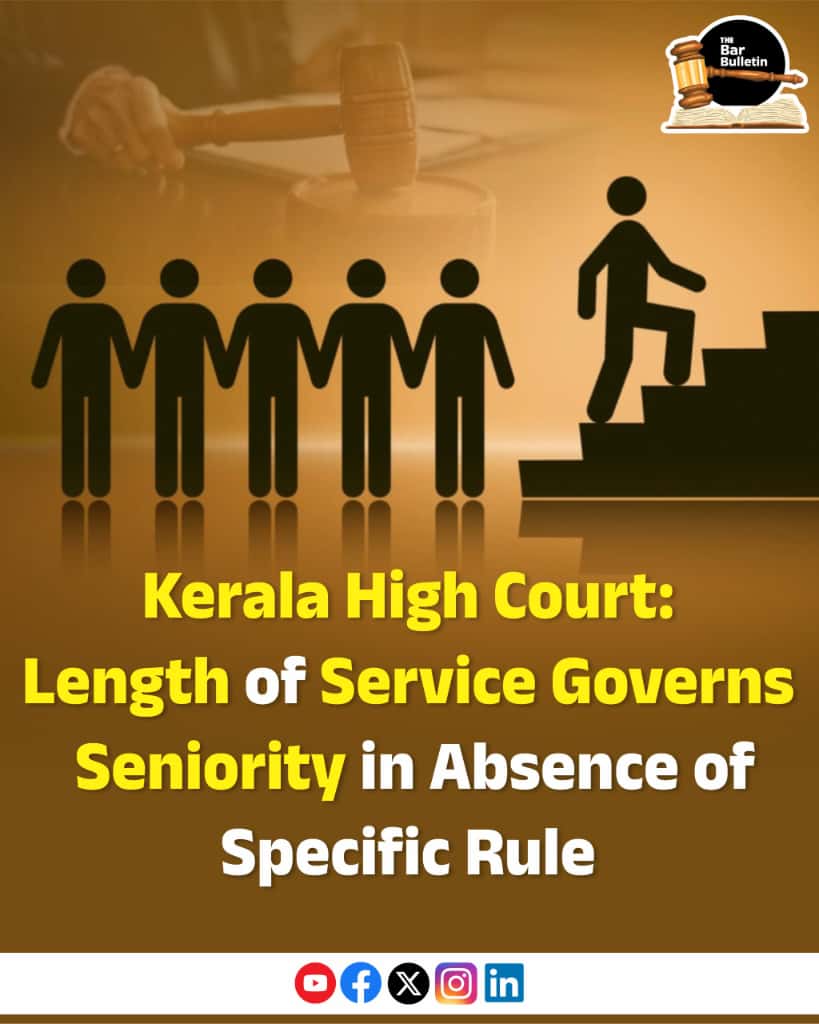The Kerala High Court ruled that the length of service is the appropriate criterion for determining seniority in the absence of any specific rules regarding the reckoning of seniority after integration of the Foremen (Civil) appointed through the Kerala Public Service Commission (KSEB) with Sub Engineers (Civil), after the settlement between two recognized trade unions, i.e., the Kerala State Electricity Board Workers Association and the Kerala Electricity Workers Federation.
Reference was made to the decision of Nirmal Kumar Choudhary and others v. State of Bihar and others [1988 Supp SCC 107], where it was held that “It is an equally well recognised canon of service jurisprudence that in the absence of any other valid rule for determining inter se seniority of members belonging to the same service, the rule of continuous officiation or the length of service or the date of entering in service and continuous uninterrupted service thereafter would be valid and would satisfy the tests of Article 16”.
The Court refused the contention of the Chief Engineer that the appellant’s seniority should be placed below the junior-most due to the absence of any specific provision, and therefore, directed the respondents to recast the seniority list and assign seniority to the appellant in light of the Nirmal Kumar Choudhary case.
The Division Bench comprising Justice Sushrut Arvind Dharmadhikari and Justice Syam Kumar V. M., therefore, observed that the Single Judge had erred in concluding that there was no specific provision in the settlement stating that integration would take effect from the date on which the appellant was appointed. Therefore, the appellant cannot have a valid claim to get the service rendered from the date of appointment to the post of Foreman (Civil), reckoned for the purpose of seniority.
Briefly, in this case, the appellant was appointed as Foreman Grade-II in the Kerala State Electricity Board (KSEB) on the advice of the Kerala Public Service Commission. Subsequently, the KSEB) signed a long-term settlement with two recognized trade unions, i.e., the Kerala State Electricity Board Workers Association and the Kerala Electricity Workers Federation, which provided for revision of pay and allowances and other service conditions of the workmen. Further, all Foremen (Civil) appointed through the Kerala Public Service Commission were to be integrated with Sub Engineers (Civil), and the post of Foreman (Civil) was abolished from the date of the settlement. Later, it was ordered that the five integrated Foremen (Civil) would be placed junior to the junior-most Sub Engineer (Civil).
Challenging the same, the appellant requested that his service be reckoned from the date he entered service. Due to inaction on the representation, the appellant approached the High Court, where the KSEB was directed to consider the claim of the appellant. Again, the Chief Engineer rejected the representation, stating that the post of Foreman (Civil) did not have any promotional avenues and that before the integration, the two cadres were entirely different, with separate channels for recruitment, promotion, and other service conditions. It was also stated that even though the scale of pay of both the cadres and the qualification prescribed for the posts were similar or identical, seniority in the cadre of Sub Engineer (Civil) cannot be assigned to the appellant with effect from the date of his joining as Foreman (Civil).
The matter again reached the High Court, where the Single Judge concluded that there is no specific provision in the settlement stating that the integration would take effect from the appellant’s original appointment date or that seniority upon integration would be reckoned from the date of entry into service as Foreman (Civil). Therefore, the Single Judge held that the appellant has no valid claim to have his service as Foreman (Civil) counted for seniority purposes.
Case Relied On:
Nirmal Kumar Choudhary and others v. State of Bihar and others [1988 Supp SCC 107]
Appearances:
Senior Advocate Elvin Peter P.J., along with Advocates K.R. Ganesh, N.R. Reesha, and T.S. Likhitha, for the Appellant
Advocate M.K. Thankappan, for the Respondent



